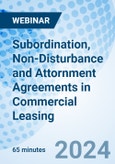Gain an understanding of the objectives of an SNDA and the practical tips for drafting and negotiating them.
This highly informative topic is designed to enhance your knowledge and understanding of Subordination, Non-Disturbance, and Attornment Agreements (SNDAs) as well as Estoppel Certificates which are often ancillary thereto in today’s commercial lease environment. The program will discuss the importance of thoroughly reviewing these critical documents and the various provisions within each.
Learning Objectives
- You will be able to review and analyze SNDAs more efficiently and cost-effectively.
- You will be able to identify the respective rights of the tenant, the lender and the landlord under SNDAs.
- You will be able to discuss and explain why certain items/protections should be included or excluded from SNDAs during negotiations from the perspective of the tenant, the lender and the landlord.
- You will be able to explain the importance of having SNDAs and Estoppel Certificates carefully reviewed by counsel.
Agenda
General Overview
- Letter of Intent/Term Sheet
- Parties’ Leverage
- General Economic Conditions
- Specific Location of Premises
- Desirability of Particular Property
- Tenant’s Net Worth/Creditworthiness/Financial Condition
- Economics of Lease (e.g., Rent, Tenant’s Proportionate Share)
- Historical Perspectives
Basic Concepts
- What Is an SNDA?
- Definitions
- Significance
Subordination Lease Provision
- Automatic (Existing and Future)
- Commercially Reasonable Efforts V. Best Efforts V. Conditioned Upon Obtaining
Lender Perspective/Protections
- Non-Responsibility
- Payment Demand
- Notice of Landlord Default/Cure Rights
- Exculpation/Limitation of Liability
Tenant Perspective/Protections
- Subordinate to the Mortgage V. Subordinate to the Lien of the Mortgage
- Responsibility
- Lender Consents/Approves Lease
- If Tenant Made Party to Action, Indemnification by Lender
- If Requested to Pay Lender, Tenant Not Liable/Landlord Acknowledgment
Landlord Perspective/Protections
- Not Increasing Tenant’s Rights or Landlord’s Obligations Under the Lease
- Not Decreasing Landlord’s Rights or Tenant’s Obligations Under the Lease
Estoppel Certificate
- What Is It?
- Significance
- Tenant Perspective/Protections
Miscellaneous Issues
- Recordation
- Legal Description Attached
Conclusion and Questions
- Importance
- Not Ministerial/Perfunctory - Should Be Reviewed by an Attorney
Speakers

Jan Alan Lewis, Esq.,
Cole Schotz P.C.- Member of Cole Schotz P.C.’s Real Estate Department
- Over 40 years of experience, concentrating in commercial office and industrial leasing, representing both landlords and tenants on a local, regional, and national basis
- Handled various complex real estate transactions on behalf of prominent owners, developers, and companies throughout the United States and has frequently been retained as local counsel to represent tenants with respect to their leases
- Responsibilities include the preparation, review, and negotiation of leases and related documents for commercial (e.g., office, industrial, flex/warehouse, and retail) properties, including brokerage agreements, property management agreements and exclusive leasing agreements, estoppel certificates, and subordination, non-disturbance, and attornment agreements
- Member of the National Association of Industrial and Office Properties, as well as the New Jersey State Bar Association, New York County Lawyers’ Association, and the American Bar Association
- Frequent lecturer and author of numerous articles on the subject of commercial leasing
- Achieved the highest rating in the Martindale-Hubbell Law Directory
- J.D. degree, Temple University Beasley School of Law; B.A. degree, summa cum laude, Lehigh University
- Can be contacted at 201-525-6228 or jlewis@coleschotz.com
Who Should Attend
This live webinar is designed for attorneys, presidents, vice presidents, property managers, real estate professionals, developers, landlords, building owners and managers, and accountants.









